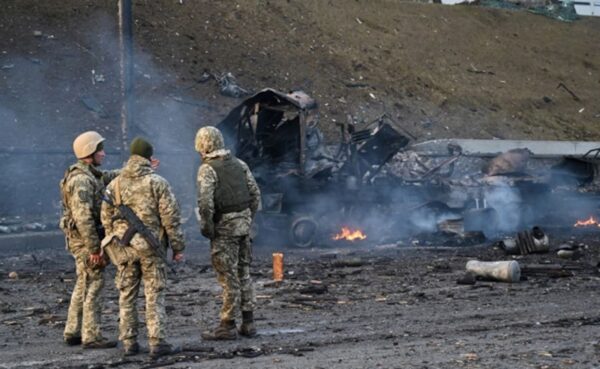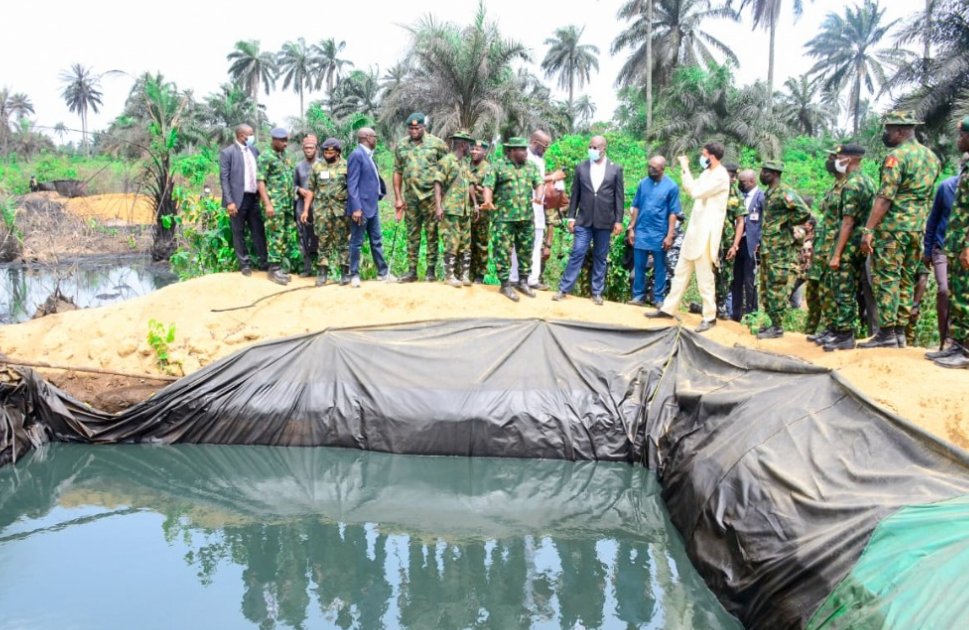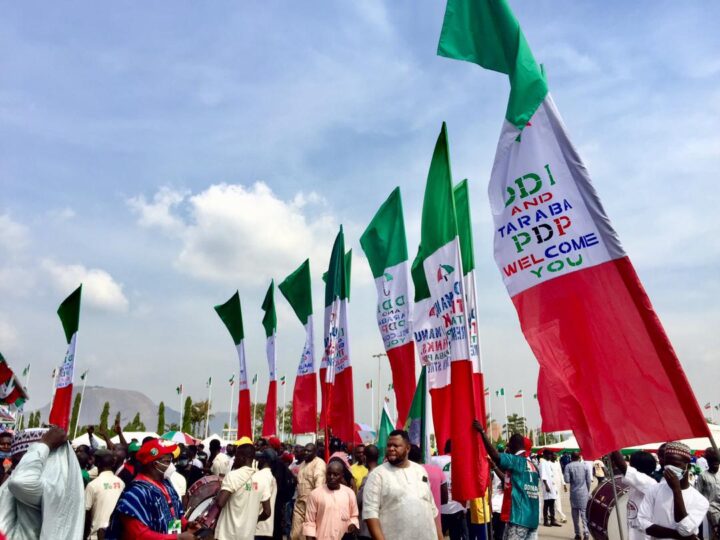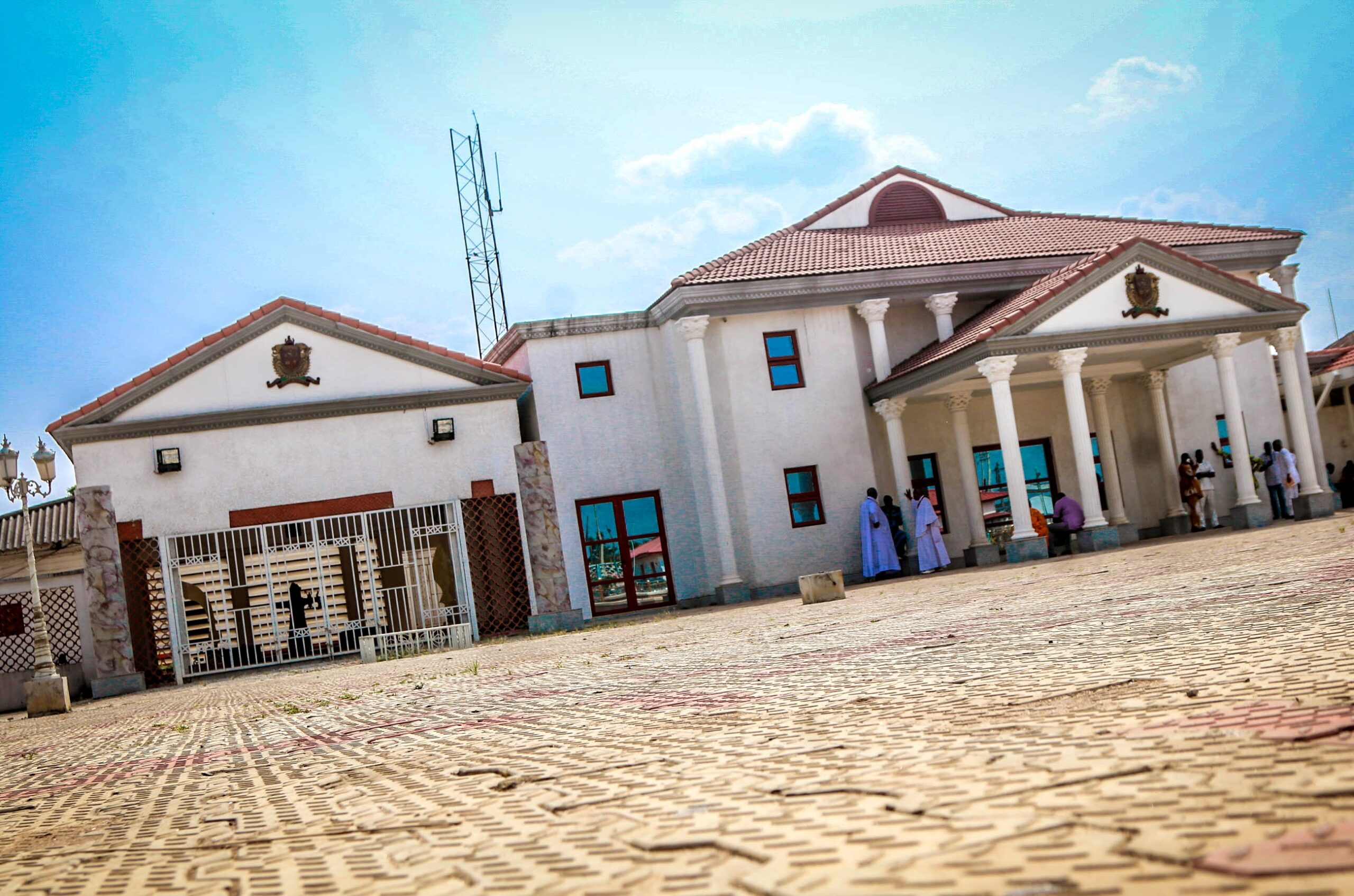BY SHOLA ADEBOWALE
“How dreadful knowledge of the truth can be, when there’s no help in truth” Teiresias in Sophocles’ Oedipus Rex
The FTSE 100 index in London finished 251 points lower at 6,998, with a 3.5% drop, its largest decline since March 2020. The German’s Dax in Frankfurt fell than 4%, its lowest level since late 2020. While, the Italian index tumbled by 6.2%, to its lowest level in more than a year. Europe’s Euro Stoxx 600 index closed at its lowest level in almost a year. S&P 500, a proxy for the United States stock market fell by 10%. None of the Asian markets was immune as India’s Sensex crashed to 1,600 points. Japan’s Nikkei 225 was down to 850 points. Hong Kong’s index Hang Seng was down over 700 points. In the crude oil markets, Brent crude oil, nears a historic $140 from $118, breaching the 2008 levels, with a prediction to go as far as a historic $300 a barrel, if the crisis prolongs beyond expectations.
These are the rattling reactions of major markets around the world, unleashing staccatos of extreme volatility in financial and stock markets around the world, within the first two weeks of the cascading effects of the crisis in Ukraine. A nation of 44 million people, at the crossroad and crossed swords of two contending forces, as the Russian army swooped in on a three-pronged military offensive from Russia, Belarus and annexed Crimea. Russia has believed that Ukraine should be neutral by not joining the European Union (EU) and significantly the western defensive alliance, North Atlantic Treaty Organization (NATO) and that there should be non-proliferation of strategic or nuclear weapons within the territory of Ukraine, the closest neighbouring country to Russia, as the NATO security alliance consolidates its eastward expansion.
Advertisement
The fear of Ukraine joining NATO is believed by many analysts to be a perilous threat to Russia’s security, short and long term, because Ukraine is the last frontier between Russia and the encroaching seemingly hostile European powers, which is seen as being at variance to Russia’s regional and global interest and security. Putin has therefore accused NATO of constituting an existential threat to Russia’s “historic future as a nation”, and Russia cannot just idly sit back and allow such a big nation, the second-largest country in Europe after Russia, to join the rank and file of its enemies and more significantly, whose border is just some striking kilometres to the heart of its celestial capital city, Moscow.
Therefore, in what could be termed to be reminiscent of Slocombe’s strategy during Jimmy Carter’s administration that spurred a CIA covert operation to counter Soviet belligerency, at the height of the cold war, by tactically inducing the Soviet Union to intervene in Afghanistan in 1979 and thereby getting stuck in the ensuing quagmire, inflaming global Islamic communities against the Soviet Union and eventually leading to its disintegration, Russia was compelled by seemingly hostile stalking aggression from its western frontiers to launch a dreadful invasion of Ukraine on February 24, 2022.
However, in a swift diplomatic reaction at the highest echelon of power around the world, world leaders unequivocally, with just a few dissension unleashed what it termed as “sweeping sanctions” against Russia, targeting Russia’s economy, financial institutions, businesses and individuals, in such frenzied attempt to isolate Russia politically and economically.
Advertisement
For instance, the assets of the Russian central bank has been frozen by the US; its major banks have been shut out of the SWIFT (Society for Worldwide Interbank Financial Telecommunication) global payment messaging system; its major banks denied access to European Union’s capital and financial markets. Simultaneously, its oil and gas have been banned in major markets of the world that aligned with the US. The $11 billion NORD Stream 2 gas pipeline, a major investment between Russia and European companies has been halted by Germany. Russian air carriers have been barred from airspace over the EU and Canada. Large US companies like IBM, Procter and Gamble, Oracle, Cisco, SAP have withdrawn from Russia, while JP Morgan Chase has removed Russian debt from its bond indices.
Energy giants such as Shell and BP have offloaded their major investments in the Russian energy market. Sporting activities are neither spared as well, as the Champions League Final in St Petersburg and Formula 1 Grand Prix have both been cancelled, while FIFA has banned Russia from participating in the 2022 World Cup. Militarily, NATO has activated its rapid reaction force to its greatest level of alertness ever. Specifically, there have been regimes of crunchy sanctions that target Russia’s energy, transport and technology sectors. The political, economic and social exclusion of Russia seemed to have been perfected.
Consequences of weaponising sanctions in a globalised economy
However, behind the veneer of all these sporadic, sweeping, swift, severe but impetuous bandwagon sanctions or reactions, is unexpectedly the indisputable fact of the catastrophic consequences, they are going to unleash on international trade/economic, political and social well being of the entire world and the world that would emerge from the rubble of this crisis would largely be different to the extant world the world has come to know and used to, since the end of the Cold War. This crisis will undoubtedly mark a more profound seismic shift in the world going forward, of that there is no iota of doubt.
Advertisement
Global economic integration championed by the West as the fulcrum of the idea and ideal of a global village or globalisation in which interdependence, interrelationship and interoperability of global economic, political, and cultural system of the world become more profoundly interrelated, making it more an ominous menacing consequence, that injury to one, is an injury to all. It is now extremely difficult to insulate any economy from any untoward effect from the peril that befalls the economy of the other one, that was why the Mexican Peso crisis, when the sudden devaluation of the Peso against dollars in 1994, led to the first international financial crisis and to stem the tide of the devastating crisis, it was about to unleash on the world economy, the then US president, Bill Clinton, had to bail out Mexico with about $20 billion. Bear in mind that Mexico is not even a major player in the world economy, yet a little domestic crisis in that corner of the world threatened a butterfly effect all around the world.
Therefore, in a globalised economy, the unintended consequences of all these so-called “sweeping sanctions” are better imagined. It will certainly limit global supply and raise prices of commodities for average consumers in the coming days beyond manageable proportions. Europe has been said to likely quickly feel the impact more than the rest of the world, as German’s Mercedes-Benz has already cut production output because of disruption in parts like wire harnesses which are majorly sourced from both Ukraine and Russia. Presently, IHS Markit, a UK based research firm is predicting that about 3.5 million vehicles will be off from the global markets in 2022, due largely to the expected dearth of supply of semiconductors chips from Ukraine and Russia. Ukraine is the critical source of neon gas, while Russia is the largest source of palladium, a major component for catalytic converters in automobiles. Danish Maersk and German DHL (which are some of the world’s largest logistic companies) have suspended freighting through China-driven Eurasian Railroad, connecting China through Russia to major markets in Europe, therefore disrupting the global logistic system with monumental consequences in European markets. Therefore, commodity prices surge at aggressive spiralling prices in already suffocating global markets, the energy market is now jolted to an all-time high as pointed out earlier. In the commodity markets, the price of strategic commodities like palladium, cobalt, platinum, iron, exclusively produced in Russia has jumped drastically. In fact, highly essential commodities in the world markets which are mostly from Russia, like gold, diamond are now experiencing a sharp increase in prices. Similarly are food items like wheat, barley, canned, fresh and frozen fish, over which Russia is strategically positioned as the largest producer and exporter.
In addition, cutting Russia from SWIFT is like a sword of Damocles that will affect both ways, as it will also affect global banks whose business transactions rely on Russia as well. For instance, international lenders like UBS Swiss, the biggest wealth manager in the world, has announced its exposure to Russian assets used as collateral, to be about $200 million, France’s Société Générale, reported exposure of about $20.4 billion dollars, Austria’s Raiffeisen, reported direct exposure to Russia of about $2.8 billion. All of these are expected to limit the ability of such global banks to settle their financial commitments, with greater consequences on trade, commerce and investments.
Russia is one of the world’s largest oil-producing nations, accounting for 10 % of the global supply of oil and gas, according to the International Energy Agency. With an export of about five million barrels of oil daily, it is the second-largest crude oil exporter after Saudi Arabia. In Europe, Russia is the major source of highly needed energy in the strategic global economic belt with about 30% of the oil and 40% of the gas going to the European markets. The vacuum that would be created by such a sudden cut in oil exports into the world market, as the ban takes root is now leading to the highest crude oil prices in a decade with dire multiplier effects across board. The longer the war, the higher the more the risks ripple effects and the more damage to the world economy that is barely recovering from the effects of the COVID-19 pandemic.
Advertisement
The presupposition or rightly put presumptuous disposition that the 3.5 million barrels of oil, tons of gold, coal, titanium, aluminium, and other essential commodities the US quickly bought from Russia before announcing any sanction and its sudden policy conundrum that hitherto sanctioned Venezuela and Iran, now considered as the newfound messiahs of the world, whose crucifixion should be interned at present, can meet up with the shortfalls in global commodities or oil supply are symptomatic of the shortsightedness and infantile flippancy of the crop of leaders that are presently ruling the world. Such erratic and unprincipled about-turn, only expose its underbelly to the world to see with such opprobrium that its inordinate propensity in exploiting the instrumentality of sanction is merely a deceitful weapon of blackmail and not for any altruistic moral concern, as it wants the world to believe and accept hitherto.
Realignment and the new arms race
Advertisement
Germany, a nation that has restricted itself from armed conflicts since the end of World War II, has increased its defence spending to the statutory NATO’s 2% of GDP target and becoming more assertive in military activities. The Australian government has now outlined plans for a new $7.4 billion nuclear-powered submarine, opening a potential new alliance in the Indo-Pacific region, in view of the anticipated tensions with China, whose failure to condemn Russia is regarded as a ‘wake-up call’. The EU is now discussing how to boost its defence capabilities, a simple euphemism that a new arms race is gradually unfolding in mainland Europe. Certainly, a new global arms race is in the offing, as a neoteric arc of powers is believed to be aligned to challenge or resist and reset the existing hegemonic world order that developed after the collapse of the Cold War. China, having abstained from a UN and a Security Council vote to condemn Russia and to call for a withdrawal of foreign troops from Ukraine, not only criticized international sanctions against Russia but is also calling for more comprehensive strategic partnership coordination with Russia.
There is no doubt that what will emerge from this cacophony is a new political and social order that would ultimately divide the world the more by pitting the world against itself into diverse antagonistic groups. So in the offing is a neo revival of the psychology of the Cold War era of a We vs Them mentality and psychological reprogramming of the citizenry of the world. And certainly, with a daunting ethereal dread of nuclear holocaust beclouding the consciousness of the world on daily basis. There is an imminent realignment of alliance globally and geo regionally to conform to the realities of the time. With China’s ubiquitous bigger than life imprimatur all around the world, most especially in the developing nations, the emerging scenario will be greater and more expansive than ever seen hitherto, dwarfing anything that ever existed all of human history.
Advertisement
It would therefore appear that a schema of new geostrategic realignment for foreign defence and security will gradually but steadily grow out of this debacle if the prognosis from the votes for and against Russia in the UN is anything to go by. The probability of an Aethiopian-Indo-Pacific alliance, (combining the nations in the southern Atlantic, the Indian and Pacific ocean, which are home to many of the world’s largest economies like Brazil, Nigeria, South Africa, Ethiopia, India, China, Russia etc), transmogrifying from the BRICS economic block, is becoming more and more imminent, as the burgeoning threat and audacity of NATO become more expansive and expressive and the UN becomes more and more like an incongruous alumni club, for wining and dining of old and new students.
Who gains from all these?
Advertisement
There is no doubt that those in the ministry of war are in the final analysis going to smile to their various banks, little wonder then that the best performers in global stock markets since the beginning of this avoidable crisis are those in defence and commodities, for instance, BAE Systems, Glencore, Rio Tinto and Antofagasta have been making a kill. Mining and energy stocks have been benefiting from the boom in commodity prices as well. Probably or perhaps, it is expected that with such probability of a bipolar world from henceforth, multilateralism is likely going to be the sine qua non of international engagement from now going forward, reflective of the parable of Samson in the Holy Bible, ‘Out of the eater comes honey’, after all said and done.
The necessity of a new world order built on diplomacy
The world cannot continue to do the same thing the same way and expect a different result, the time has come for major think tanks in the world to come up with punitive measures to deal with any belligerent state actors, it deemed fit to punish, without bringing the world to its knee, or throwing both the bathwater and the baby down the drain in apparent angst. Using a regime of sanctions like a sword and sorcery, makes such a lazy man’s idea of dealing with global issues, most especially if it is going to be against a major player with such a behemoth economy the size of Russia, famously described as an energy superpower of the world. Because there would be no known strategies to prevent the unintended consequences of such actions with the far-reaching global implications they portend for the entire world.
The interdependence of the global economy in a world driven by the concept and vision of globalisation will make sanctions against any nation with an expansive economy spiral out with a butterfly effect against the economies of many other nations in a domino fashion, with rising inflation and concomitant excruciating recession. Any large scale disruption in the global supply chain will always stimulate inflationary pressure around the world, leading to increasing rates in prices of highly essential commodities and greatly having devastating direct effects on consumers all over the world. It is expected that all these power game among the powerful nations would only foster humanitarian and strategic catastrophe around the world, as each power create and recreate such moral hazards for the entire world in their bid to gain more strategic ground and influence in the world.
If all these moves are intended to make Putin stand down, then nothing could be far from the truth than the reality of the plummeting of Ukraine more dreadfully and steadily, all the ubiquitous sanctions notwithstanding. Putin seemed to have learnt a big lesson from the sanctions that were imposed on Russia in 2014 and therefore provided enough safe havens against any consequences his actions might trigger. In the first place, it has even been discussed that the 2014 sanctions itself had a marginal effect of barely 1% on Russia’s GDP. We have even seen in Iraq, Iran, Cuba, Pakistan, India, Serbia among others, how unilateral sanction as a foreign policy of the US is becoming ineffective. And therefore, beyond the symbolism of “we are sanctioning Putin” and all the blustering grandstanding is the indisputable reality that Putin has become more aggressively strategic and assertive. Undoubtedly, the costs of unilateral sanctions outweigh the benefits. The more reasons, the world today yearns for multilateral ethical decisions, values and action-driven strategy to address many of the world’s ever-present challenges.
In other words, as stocks begin to tumble, commodity prices surge uncontrollably and currencies sink, the world stands at a dreadful, fretful tiptoe in hopelessness and uncertainty of what the new emerging realities will bring. The escalating geopolitical conflict in Europe with the sheer disproportionate magnitude to alter the economic, political and institutional architectures of the world is gradually falling into irreversible chaos. There is, therefore now, a new sense of urgency as dialogue and diplomacy fail and.0 the spectre of war looms larger, which is merely a reflection of utter breakdown in the instrumentality of global leadership, where negotiated settlements are not sought nor upheld or held sanctimoniously at all cost. And except urgent proactive steps are taken to arrest the situation as fast as possible, the tendency and propensity of the world to question the legitimacy and primacy of the United Nations in conflict resolution are gradually gathering ubiquitous momentum. Rome was not built in a day, so also its decadence or descent or eventual disintegration was not in a day
In the final analysis, the crisis in Ukraine has the greater tendency to trigger a wider gulf in the political relations among the great powers, with intermediary powers and minions coalescing within the sphere of influence and alliance of the greater powers. And in the shadows of all these, all the attempts to alleviate the age-long precarious political tensions, pre and post Cold War era wise, would only exacerbate them the more. Isolating Russia would only boomerang against the world, by shutting the doors against a détente that could have encouraged a rapprochement as a sort of foreign policy strategy.
Economically and strategically, the world that will emerge from this crisis will be totally different, as aggressive restructuring of international trade and commerce will take place among friends and against foes as a new currency of choice. Socio-culturally, the world that will emerge from the chaos of this crisis, will be more unaccommodating among itself, as a resurgence of confrontations and incarnation of the iron curtain between the east and west, gathers much more momentum, eroding the ability of the world to build a more cohesive alliance that could confront common global challenges of the 21st century.
It is even quite unfortunate that those now crying in a seemingly cynical manner over Europe being drawn into an unnecessary war with such unprecedented calamitous humanitarian tragedy, could not see such a poetic symmetry with what has happened in Libya, Syria or Yemen.
Views expressed by contributors are strictly personal and not of TheCable.
Add a comment






